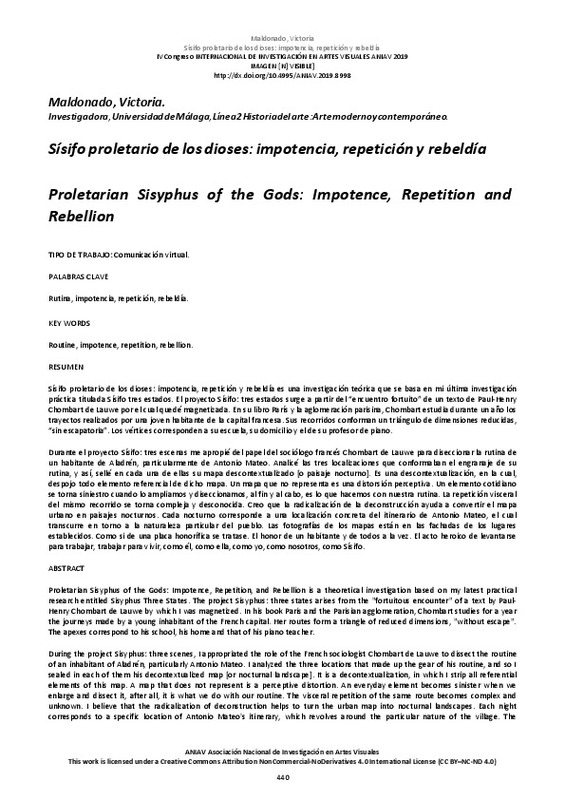|
Resumen:
|
[ES] Sísifo proletario de los dioses: impotencia, repetición y rebeldía es una investigación teórica que se basa en mi última investigación
práctica titulada Sísifo tres estados. El proyecto Sísifo: tres estados surge a ...[+]
[ES] Sísifo proletario de los dioses: impotencia, repetición y rebeldía es una investigación teórica que se basa en mi última investigación
práctica titulada Sísifo tres estados. El proyecto Sísifo: tres estados surge a partir del “encuentro fortuito” de un texto de Paul-Henry
Chombart de Lauwe por el cual quedé magnetizada. En su libro París y la aglomeración parisina, Chombart estudia durante un año los
trayectos realizados por una joven habitante de la capital francesa. Sus recorridos conforman un triángulo de dimensiones reducidas,
“sin escapatoria”. Los vértices corresponden a su escuela, su domicilio y el de su profesor de piano.
Durante el proyecto Sísifo: tres escenas me apropié del papel del sociólogo francés Chombart de Lauwe para diseccionar la rutina de
un habitante de Aladrén, particularmente de Antonio Mateo. Analicé las tres localizaciones que conformaban el engranaje de su
rutina, y así, sellé en cada una de ellas su mapa descontextualizado [o paisaje nocturno]. Es una descontextualización, en la cual,
despojo todo elemento referencial de dicho mapa. Un mapa que no representa es una distorsión perceptiva. Un elemento cotidiano
se torna siniestro cuando lo ampliamos y diseccionamos, al fin y al cabo, es lo que hacemos con nuestra rutina. La repetición visceral
del mismo recorrido se torna compleja y desconocida. Creo que la radicalización de la deconstrucción ayuda a convertir el mapa
urbano en paisajes nocturnos. Cada nocturno corresponde a una localización concreta del itinerario de Antonio Mateo, el cual
transcurre en torno a la naturaleza particular del pueblo. Las fotografías de los mapas están en las fachadas de los lugares
establecidos. Como si de una placa honorífica se tratase. El honor de un habitante y de todos a la vez. El acto heroico de levantarse
para trabajar, trabajar para vivir, como él, como ella, como yo, como nosotros, como Sísifo.
[-]
[EN] Proletarian Sisyphus of the Gods: Impotence, Repetition, and Rebellion is a theoretical investigation based on my latest practical
research entitled Sisyphus Three States. The project Sisyphus: three states arises ...[+]
[EN] Proletarian Sisyphus of the Gods: Impotence, Repetition, and Rebellion is a theoretical investigation based on my latest practical
research entitled Sisyphus Three States. The project Sisyphus: three states arises from the "fortuitous encounter" of a text by PaulHenry Chombart de Lauwe by which I was magnetized. In his book Paris and the Parisian agglomeration, Chombart studies for a year
the journeys made by a young inhabitant of the French capital. Her routes form a triangle of reduced dimensions, "without escape".
The apexes correspond to his school, his home and that of his piano teacher.
During the project Sisyphus: three scenes, I appropriated the role of the French sociologist Chombart de Lauwe to dissect the routine
of an inhabitant of Aladrén, particularly Antonio Mateo. I analyzed the three locations that made up the gear of his routine, and so I
sealed in each of them his decontextualized map [or nocturnal landscape]. It is a decontextualization, in which I strip all referential
elements of this map. A map that does not represent is a perceptive distortion. An everyday element becomes sinister when we
enlarge and dissect it, after all, it is what we do with our routine. The visceral repetition of the same route becomes complex and
unknown. I believe that the radicalization of deconstruction helps to turn the urban map into nocturnal landscapes. Each night
corresponds to a specific location of Antonio Mateo's itinerary, which revolves around the particular nature of the village. The photographs of the maps are on the facades of the established places. As if it were an honorary plaque. The honour of one inhabitant
and of all at the same time. The heroic act of getting up to work, work to live, like him, like her, like me, like us, like Sisyphus.
[-]
|








